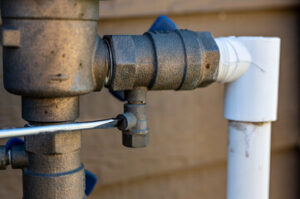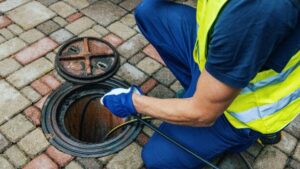Plumber Doylestown installs, repairs, and maintains the piping and fixtures that distribute water in residential and commercial buildings. Their responsibilities include interpreting building codes and regulations, working with specialized tools, and diagnosing problems like leaks or clogs.

Plumbers usually complete training programs at community colleges or vocational schools and acquire apprenticeships to gain hands-on experience in the trade. They may also work as self-employed contractors.
A residential plumber handles plumbing tasks that pertain to homes. These jobs include installing and repairing pipes and fixtures, as well as replacing toilets, bathtubs, showers, faucets, sinks, and more. They also repair a variety of appliances, including water heaters. In addition, they perform regular maintenance to ensure that the plumbing system is in good condition.
While these tasks may seem simple, there are some complexities to residential plumbing that can make them challenging. For example, clogged drains and sewer lines are common problems that can occur in a home, but resolving them requires careful work to avoid damaging the surrounding materials. Often, these issues require the use of specialized tools.
Another challenge that residential plumbers face is balancing their work with the needs of homeowners. Because plumbers typically work with multiple clients each day, it’s important to establish a consistent schedule and provide quality service at all times. It’s also crucial to develop a positive relationship with each client, as this can help them feel more confident in the plumber’s abilities and reliability.
In addition to these challenges, residential plumbers must follow strict safety protocols when working on a home’s plumbing system. This includes wearing protective gear and following proper procedures when dealing with hazardous materials. These safety measures help to ensure that the plumber and homeowner are both safe during the process.
One of the main differences between residential and commercial plumbing is the amount of usage. Commercial spaces tend to have many more people using the plumbing systems on a daily basis, which can lead to higher wear and tear. Additionally, commercial spaces need to comply with various regulatory agencies, such as the Americans with Disabilities Act.
A plumber that specializes in commercial work must have experience with a wide range of plumbing issues and a deep understanding of the complexities involved in these systems. These professionals must be able to understand and implement all relevant regulations and guidelines, as well as the latest in plumbing technology. This ensures that they can deliver the best possible service to their clients.
Commercial
Commercial plumbing involves the installation, repair, and maintenance of large water supply, waste, steam, and heating systems in a variety of buildings and premises. Commercial plumbers work closely with architects, engineers, and general contractors to ensure that plumbing systems are properly designed and integrated into the overall building structure. They also troubleshoot issues and provide routine service to maintain the functionality of these essential systems. The responsibilities of a commercial plumber can include anything from installing toilets and sinks in office buildings to designing complex water supply, pressure, and waste systems for new construction projects.
The major difference between residential and commercial plumbing is the scale of the work performed. Commercial plumbing is much more extensive than residential, and it requires a wider range of tools and skillsets to complete the work. In addition, commercial properties often have more stringent codes and regulations to adhere to, which can make the job more challenging.
When hiring a commercial plumber, it is important to find one with experience working on a wide range of building types and systems. This will ensure that they are familiar with the unique needs of each type of building and can quickly diagnose and resolve any issues. In addition, a commercial plumber should be able to work well under tight deadlines and budgetary constraints.
A good commercial plumber will have excellent people skills and be able to communicate clearly with clients. They will listen carefully to the concerns of the client and offer feedback and suggestions in a respectful manner. They will also use straightforward language and avoid technical jargon whenever possible. This will help to minimize misunderstandings and conflicts and will make the client feel comfortable and confident in the plumber’s abilities.
A plumber’s services can be vital to the success of a business. Therefore, it is crucial to choose a plumber with a proven track record of success and customer satisfaction. A reputable plumber will have an established website with detailed information about their services and a list of satisfied customers. They should also be licensed and insured.
Industrial
While residential plumbers get a lot of credit for keeping our houses running smoothly, industrial plumbers are just as important without getting nearly as much recognition. The plumbing in office buildings, shopping malls and other commercial buildings is on a far larger scale than that found in homes, and it requires different skills to keep things working properly.
Commercial plumbers deal with water pipes, heating systems, drainage and sewers on a large scale. These are typically more complex projects that require them to follow blueprints closely and understand the requirements for each part of a building’s plumbing system. They may also work on industrial machinery that uses liquid or gaseous fluids. These machines can be dangerous, so it’s critical that any repairs are made by a professional.
In addition to working on large scale projects, commercial plumbers also handle smaller jobs like installing kitchen appliances like coffee makers and toasters in business spaces. They also use specialized equipment like pipe cutting and threading to make repairs on larger pipes. These processes involve sawing or shearing sections of pipe to adjust their length or diameter. Commercial plumbers must be able to work with a wider variety of materials than residential plumbers and often have to abide by stricter code and healthcare regulations when servicing businesses.
Leaky pipes can be a huge problem in commercial settings. Not only do they waste water, but they can also cause serious damage if left unchecked. Commercial plumbers are trained to spot these problems and repair them quickly before they cause lasting damage.
The plumbing industry is constantly evolving, and many plumbers are now using technology to streamline their processes and provide a better customer experience. For example, some plumbers now offer online tools to schedule appointments or pay invoices. This helps to reduce paperwork and eliminates the need for customers to visit the office.
A career as a plumber takes commitment and education. After completing high school, prospective plumbers should enroll in vocational classes to learn the basics of plumbing and electrical engineering. Then, they should find an apprenticeship to gain valuable experience in the field. Once they have the necessary qualifications, they can become licensed journeyman plumbers.
Other
In residential settings, plumbers work directly with homeowners or apartment tenants to install and repair plumbing fixtures and appliances. This can include replacing clogged toilets, bathtubs or showers; fixing broken water heaters; installing new sinks, dishwashers or washing machines; and repairing leaking pipes or faulty valves. In some cases, plumbers may also be called to inspect and repair sewage systems. This can involve working with dangerous materials, including human waste, which may contain infectious diseases such as cholera, typhoid or hepatitis.
In commercial and industrial settings, plumbers typically work on larger-scale plumbing systems that serve multiple occupants at once, such as office buildings, retail spaces, hospitals and power plants. These plumbing systems may require more complex installation and maintenance procedures, as well as specialized tools to identify problems and fix them. Plumbers in this field often work with other construction tradespeople to ensure that their work integrates seamlessly with other building projects and adheres to all relevant standards and regulations.
There are several routes to becoming a plumber, including attending a vocational school, taking an apprenticeship or earning a certification through an online education program. Some states also have licensing requirements for plumbers, although these vary widely from state to state. In addition to technical knowledge and skills, plumbers must have good communication skills in order to explain complicated plumbing processes to customers.
Because the job involves working with potentially dangerous substances, plumbers must follow strict safety protocols at all times. This includes wearing protective clothing and using specialized tools to remove blocked drains or sewer pipes. In addition, plumbing workers must be able to read and interpret blueprints and building specifications in order to properly install or repair plumbing fixtures and appliances. Finally, plumbers should be comfortable working in confined spaces, as they often need to crawl underneath sinks or into attics to access pipes and other equipment. To increase their employment opportunities, plumbers can consider pursuing additional qualifications such as becoming a certified gas fitter or attending a trade school that offers courses in electrical, heating and ventilation systems. This can open up many more career options, as these skilled professionals are in high demand across a wide variety of industries.

